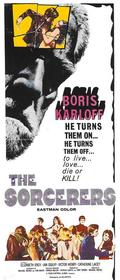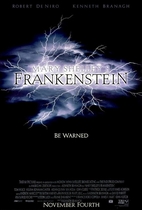Our editor-in-chief Nate Yapp is proud to have contributed to the new book Hidden Horror: A Celebration of 101 Underrated and Overlooked Fright Flicks, edited by Aaron Christensen. Another contributors include Anthony Timpone, B.J. Colangelo, Dave Alexander, Classic-Horror.com's own Robert C. Ring and John W. Bowen. Pick up a copy today from Amazon.com!
The Sorcerers (1967)
"How long do you think all this can last?" asks a bored Mike at a swinging 60s happening. And this throwaway line becomes the central thread of Michael Reeves's stunning second film The Sorcerers, the movie that would pave the way for his masterpiece Witchfinder General in 1968. While on the surface offering a seemingly carefree world of mind altering drugs, free love and promiscuous sex, Reeves instead probes deeper and suggests a darker side where moral laxity leads not to joy, but to destruction. For the characters who abandon responsibility, death is waiting.
Dr. Marcus Moserrat (Boris Karloff) is an aging medical hypnotist with a new invention. His machine can allow the elderly, disabled and incapacitated the chance to enter a younger subject's mind and live vicariously through them - experiencing their loves, laughter and excitements as if it were happening to them. To test the device, Dr. Marcus and his wife Estelle (Catherine Lacey) enlist Mike (Ian Ogilvy) a swinger looking for new kicks. The test is a success and the couple get to experience the exhilaration of Mike swimming with his girlfriend Nicole (Elizabeth Ercy) and riding full tilt on a motorbike. Marcus is ready to give his invention to the public, but Estelle wants more. She wants to know what it's like to steal, to make love again and to kill. After all, it isn't really her doing these things, is it?
The Sorcerers' key theme of living through others has been seen, perhaps rightly, by many critics as a neat metaphor for the experiences of the average cinemagoer. The Moserrat's sit in their darkened living room and escape into a world that is not their own, just like anyone watching a film. But Reeves goes further than that, and his eye seems to focus primarily on the culture of the time and the question of culpability. Mike is a paid up member of the free love generation, an excuse he uses to abandon his responsibility for other people. He treats his friends like commodities, ditching them without a word and then picking them up again when he's in need of company. In a later scene, he pays a visit to an ex-girlfriend (Susan George) and Reeves suggests that this is another girl tossed aside by Mike and called upon only when he's feeling desperate. "Why have you come here?" she asks incredulously.
Ogilvy plays Mike with a kind of glassy-eyed detachment, as if his soul, long before the film's explosive conclusion, was already dead. His life is an attempt to find, as Estelle says, "Ecstasy with no consequence," but it will always remain beyond his grasp. In this way Estelle and Mike are mirrored, and her own desire for youth and moral freedom ties her in with Mike and the 60s youth culture. For the Moserrats the clock is ticking and a life of quiet banality in their narrow London home is all they have to show for it. Estelle uses the machine to unleash all her repressed desires. She wheezes in fits of carnal delight as Mike cuts up a girl with a pair of scissors and rocks with laughter at the bloodshed (all shot from a low angle making her look like a deranged harpy). She becomes the film's central demon and it is to the credit of Reeves (and indeed Catherine Lacey) that they can make a seemingly benign old lady such a figure of terror.
In terms of direction, Reeves has fully assimilated the 60s psychedelic vibe, a choice that allows him to fully explore the culture, but one that also serves to date the movie. The clubs are awash with Technicolor lights (while the patrons innocently sip coca-cola) and the Moserrat's hypno-device turns their white room into a freaked-out disco (with purples, yellows and far out pinks). The editing too is frantic and seems to be designed to keep up with Estelle's manic energy, frequently cross-cutting between Mike and the Moserrats when they're in control of his mind. In the final act, the twisted extreme close ups of Estelle are cut in an almost gloating fashion as Mike is forced to strangle a nightclub singer. This technique makes it evident that Estelle cannot escape her actions and she too has blood on her hands (literally too as a cut Mike receives on his hand also appears on hers).
Oddly it is in Karloff, that denizen of horror, that the film find it moral center. Ancient, arthritic, stumbling on a wooden cane behind white hair and wild eyebrows, he is forced to watch as his altruistic device is perverted by the woman he loved. There has always been a deep humanity to Karloff as a performer (witness the childlike innocence of his monster in 1931s Frankenstein) and here he uses that to fully ally our sympathies. He begins as a kind of mad professor (albeit from a fundamentally 60s British perspective - picking up test subjects in a greasy spoon and running experiments in an analogue lab) and ends tied up and forced to share Estelle's murderous desire.
But for Reeves, Karloff's Dr. Marcus was doomed the minute he created the device (emphasized by Paul Ferris' score that chimes like a death clock). This is a film about paying for one's actions, no matter how noble the initial intention. Reeves crafts this theme neatly and brings to the fore the darkness inherent in the 60s counter culture (that would explode in the real world with the Manson slayings in 1968 and the Hells Angels/Rolling Stones debacle in '69). And come the film's conclusion, Dr. Marcus has learnt two things from the free love generation - 1. nothing lasts forever and 2. when you abandon your soul, the fires of hell are never far away.
This review is part of our Shocktober Classics 2009: Staff Screams event.









Excellent review, Tom! This